Should You Sign A Waiver Of Accounting In A Florida Probate?

After the personal representative of an estate has fully administered the estate, they will file a petition for discharge, which ends the probate administration process. However, prior to the end of the administration process, the beneficiaries of the estate may be asked to sign a Waiver of Accounting.
If you have been asked to sign the waiver, you may wonder, “What does a Waiver of Accounting mean?” and “Should I sign the waiver to end the estate administration process?” Consult with our St. Petersburg probate administration attorneys at Legacy Protection Lawyers, LLP, to discuss your particular case and determine whether or not you should sign a Waiver of Accounting.
What is a Waiver of Accounting?
Once the personal representative has fully administered the estate, there is only one step left: To make distributions to the intended beneficiaries and close the estate. However, before the distributions are made, the personal representative has to file a final accounting.
The filing of a final accounting is governed by Florida Probate Rule 5.400, which deals with “Distribution and Discharge.” Under Probate Rule 5.400, the personal representative of the estate must file a petition for discharge along with a final accounting to close the estate.
The personal representative must also follow the requirements found in Florida Probate Rule 5.346 (“Fiduciary Accounting”) when filing a fiduciary accounting. Florida Probate Rule provides strict requirements to make sure that the accounting is clear and consistent.
When served with a copy of the petition for discharge and the final accounting, interested parties, including beneficiaries, will have 30 days from the date of service to object to the final accounting. A beneficiary must file their objection in writing. The objection must be served on the personal representative and other interested parties.
However, the personal representative can waive the accounting by asking the beneficiaries to sign a Waiver of Accounting.
Should You Sign a Waiver of Accounting in Your Probate?
Final accountings can increase the cost of probate, not to mention that accountings can be time-consuming in a Florida probate. However, a personal representative cannot close the estate without the final accounting and until the deadline for objections (30 days) has passed.
But it is possible to bypass the costly and time-consuming accounting process by signing a Waiver of Accounting. When the waiver is signed, the distributions will be made to the beneficiaries. After the distributions are made, the estate will be closed.
But should a beneficiary agree to sign a Waiver of Accounting when asked by the personal representative? Unfortunately, there is no clear-cut answer to that question because each case is unique.
In most cases, signing a Waiver of Accounting makes sense as long as the personal representative has provided comprehensive information about accounting when administering the estate. A final accounting may not be necessary if all the information has been provided to the beneficiaries during the administration.
However, if the personal representative has failed to provide sufficient information about the assets, legal fees, costs, expenditures, and all cash and property transactions during the administration, signing a waiver of accounting may not be a good idea.
However, as mentioned earlier, each case is unique. That is why you should talk to an experienced attorney to determine whether or not you should waive an accounting in your specific case. Schedule a consultation with our lawyers at Legacy Protection Lawyers, LLP, to discuss your options. Call 727-471-5868.
